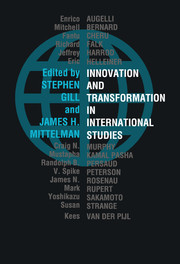Book contents
- Frontmatter
- Contents
- List of contributors
- Preface
- Acknowledgements
- Part I Rethinking and remaking the roots of global social and political theory
- Part II Political economy: the social and ecological anatomy of transformation
- 5 Ecology, political economy and the counter-movement: Karl Polanyi and the second great transformation
- 6 Braudelian reflections on economic globalisation: the historian as pioneer
- 7 Social forces and international political economy: joining the two IRs
- 8 Transnational class formation and state forms
- Part III Transformation, innovation and emancipation in global political and civil society
- Part IV Reflections on global order in the twenty-first century
- References
- Index of names
- Index of subjects
7 - Social forces and international political economy: joining the two IRs
Published online by Cambridge University Press: 05 July 2011
- Frontmatter
- Contents
- List of contributors
- Preface
- Acknowledgements
- Part I Rethinking and remaking the roots of global social and political theory
- Part II Political economy: the social and ecological anatomy of transformation
- 5 Ecology, political economy and the counter-movement: Karl Polanyi and the second great transformation
- 6 Braudelian reflections on economic globalisation: the historian as pioneer
- 7 Social forces and international political economy: joining the two IRs
- 8 Transnational class formation and state forms
- Part III Transformation, innovation and emancipation in global political and civil society
- Part IV Reflections on global order in the twenty-first century
- References
- Index of names
- Index of subjects
Summary
The editors of this volume announced in one of their earlier communications an ambitious purpose: ‘to conceptualise and analyse change in international relations and International Relations theory’. From the standpoint of a holist, generalist, eclectic, or student of the condition of humankind, such a purpose, is however, already constrained. Constrained, that is, by the distinguishing of a separate, specialised, compartmentalised and professionalised segment of human activity, labelling it ‘International Relations’ and then endowing that segment with theory of its own.
This compartmentalising process is, of course, part of the structure of knowledge production of the twentieth century. It is the century of fragmentation, specialisation and the denial of intellect as a potentially allencompassing capability for comprehending the human condition. This process may make it more difficult to achieve the stated greater purpose of this volume – to examine the ‘prospects for the transformation of the present world order in a more just, democratic and sustainable direction’. Such a project would, in my view, be difficult within the existing professionalised academic area of International Relations. It would require a firmer base in philosophy, history and social theory and other such fields which have an original and fundamental intent to examine universal orders of humankind to which dissidents can, in the last resort, appeal when pushed towards greater specialisation, ‘scientism’ and empiricism.
- Type
- Chapter
- Information
- Innovation and Transformation in International Studies , pp. 105 - 117Publisher: Cambridge University PressPrint publication year: 1997
- 5
- Cited by



